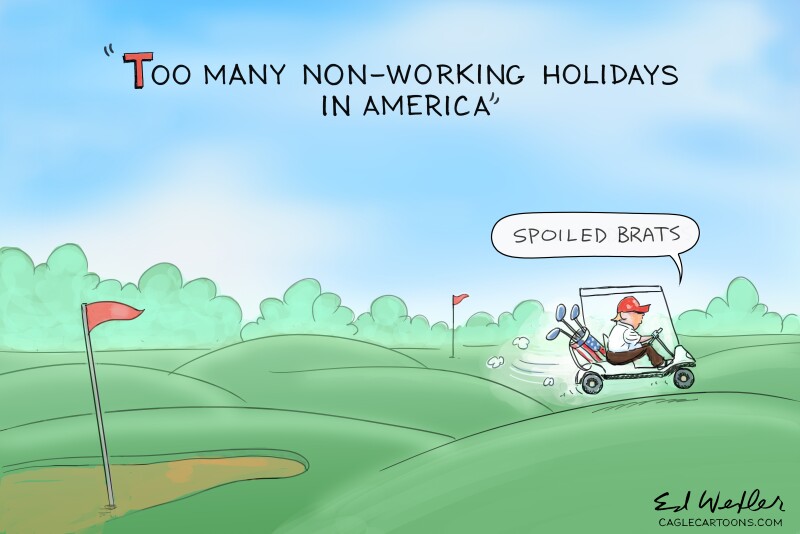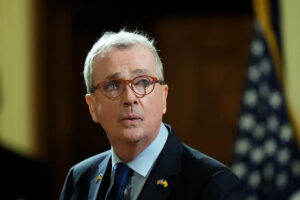
In a striking piece of visual commentary, editorial cartoonist Ed Wexler has turned his artistic lens on former President Donald Trump’s recent post on Truth Social concerning Juneteenth. The cartoon, published on Tuesday, July 1, 2025, captures the ongoing debate surrounding Trump’s statements and their implications on social media platforms.
Wexler’s cartoon, known for its incisive wit and sharp critique, offers a visual interpretation of Trump’s controversial post, which many have deemed insensitive. This latest work adds to Wexler’s reputation for tackling political issues with a blend of humor and critical insight, resonating with audiences who follow the evolving political landscape.
Trump’s Juneteenth Post: A Brief Recap
On June 19, 2025, Trump posted on Truth Social, a platform he frequently uses to communicate with his followers, marking Juneteenth—a day commemorating the end of slavery in the United States. His post, however, was met with backlash, as critics argued it failed to appropriately honor the significance of the day.
Juneteenth, which became a federal holiday in 2021, holds deep cultural and historical importance, particularly within African American communities. Trump’s post, perceived by many as lacking in sensitivity, reignited discussions about his approach to racial issues during and after his presidency.
Wexler’s Artistic Commentary
Ed Wexler, who has been a prominent figure in editorial cartooning, uses his platform to comment on political and social issues. His latest cartoon encapsulates the tension surrounding Trump’s post, employing satire to question the former president’s understanding and acknowledgment of Juneteenth’s significance.
Wexler’s work often reflects broader societal sentiments, and this cartoon is no exception. By highlighting the disconnect between Trump’s message and the day’s historical context, Wexler invites viewers to reflect on the broader implications of political rhetoric in shaping public discourse.
Expert Opinions on the Impact of Political Cartoons
According to Dr. Lisa Thompson, a professor of media studies, editorial cartoons play a crucial role in political commentary. “Cartoons like Wexler’s distill complex issues into accessible imagery, often provoking thought and discussion in ways that traditional media cannot,” she explains.
“Editorial cartoons have a unique power to capture the essence of political debates, often serving as a catalyst for public engagement,” Dr. Thompson adds.
The role of editorial cartoons has evolved over the years, but their ability to influence public opinion remains significant. Wexler’s work, in particular, is noted for its ability to engage audiences by blending humor with hard-hitting truths.
The Historical Context of Juneteenth
Juneteenth, celebrated annually on June 19th, marks the day in 1865 when enslaved African Americans in Galveston, Texas, were informed of their freedom, two and a half years after the Emancipation Proclamation was signed. The day has since become a symbol of African American freedom and resilience.
While Juneteenth has been celebrated for over a century, its recognition as a federal holiday in 2021 was a significant milestone. This recognition was seen as a step towards acknowledging the historical injustices faced by African Americans and promoting a more inclusive understanding of American history.
Looking Ahead: The Role of Social Media in Political Discourse
The controversy surrounding Trump’s post underscores the influence of social media in shaping political narratives. Platforms like Truth Social have become arenas for political figures to communicate directly with the public, bypassing traditional media filters.
As social media continues to evolve, the impact of posts by influential figures remains a subject of debate. Experts suggest that while these platforms offer unprecedented reach, they also pose challenges in terms of accountability and the spread of misinformation.
“The digital age has transformed how political messages are disseminated and received. It’s crucial for users to critically evaluate the content they encounter,” notes Dr. Sarah Martinez, a digital media analyst.
As the conversation around Trump’s Juneteenth post continues, Wexler’s cartoon serves as a reminder of the power of art in political discourse. It encourages viewers to engage with the issues at hand and consider the broader implications of political communication in the modern era.







